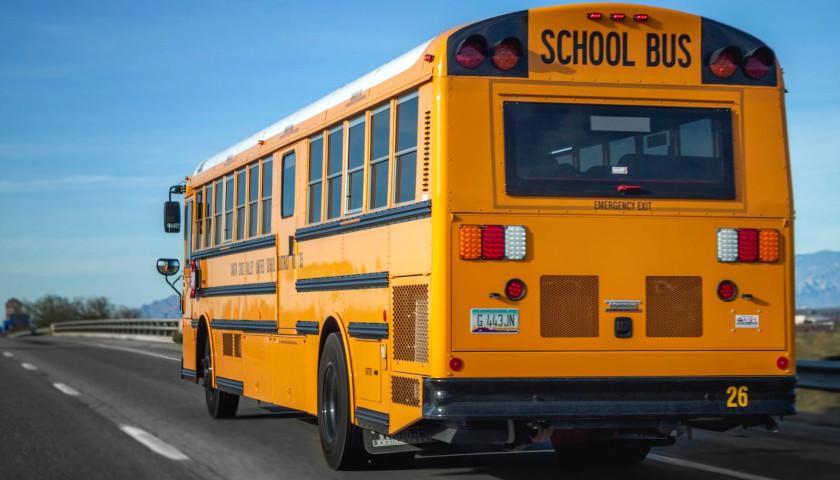Though children are least likely to experience severe illness from COVID-19, the level of mental health distress many are exhibiting during the government response to the pandemic is “utterly devastating,” child psychiatrist Dr. Mark McDonald said in a recent interview.
The Los Angeles-based clinician expressed his concern during a late November podcast for the Unity Project, an organization working to end COVID-19 vaccine mandates for healthy children in grades K-12.
McDonald stressed that it has been the “government’s response, not the pandemic itself” that has been “utterly devastating to the mental health of my patients.”
He explained the severe types of behavior he has seen among his young patients over the past two years:
I have never witnessed as acute of an increase in anxiety, depression, and other self-harming behaviors as I have in my pediatric population in the last two years.
…
I have never been through this level of disruption of mental and emotional stability of my patients in my career. Bedwetting, drug use, violence, incarceration, inpatient hospitalizations, internecine warfare within the family. It is an absolute disaster and it is all due to three things. It is due to closure of schools; it is due to mask mandates; and, now, more recently, to mandatory vaccines.
Johns Hopkins massive meta-analysis finds lockdowns caused only widespread destruction and did not save lives. I said this publicly in May 2020. https://t.co/QeMfN3snge
— Dr. Mark McDonald (@MMcDonaldMD) February 2, 2022
McDonald cited a study, published this past August, in which researchers found children born during the pandemic performed at a significantly lower level on standardized neurodevelopmental tests of verbal, motor, and overall cognitive ability, compared to children born pre-pandemic.
Nature also reported in January the results of the same study at Brown University’s Advanced Baby Imaging Lab in Providence, Rhode Island:
When they compared results across participants, the pandemic-born babies scored almost two standard deviations lower than those born before it on a suite of tests that measure development in a similar way to IQ tests. They also found that babies from low-income families experienced the largest drops, that boys were more affected than girls and that gross motor skills were affected the most.
The Nature report noted that, despite some skepticism expressed by other health professionals about the pandemic’s long-term negative effects on intelligence in babies, Sean Deoni, a medical biophysicist who served as the study’s principal investigator, grew more worried after he found children accumulated further deficits as the pandemic continued.
“The magnitude is massive — it’s just astonishing,” he said of his findings, which are now under revision in JAMA Pediatrics.
The researcher suspects the results he is seeing come from babies’ and toddlers’ lack of interactions with others.
In a still unpublished follow-up study, Deoni and his colleagues recorded parent—child interactions in their homes and found that parents and children have been speaking fewer words to each other within the past two years compared to previous years.
Deoni also told Nature he suspects babies and toddlers are not getting sufficient gross motor skill practice during the pandemic since many families have avoided playgrounds and other public spaces in which children can play freely and interact with others.
“And the unfortunate thing is that those skills kind of lay the foundation for all the other skills,” he said.
McDonald fears the government’s response to the pandemic has led to social brain damage for children “by keeping them from school, by forcing them to wear masks, by isolating them, by depriving them of the normal and necessary integrated social, psychological and emotional connections with other people and with their environment.”
Fantasy vs Reality, by @MMcDonaldMD https://t.co/YR3Xxom8oc
— Dr. Mark McDonald (@MMcDonaldMD) January 27, 2022
Another study, published in October at Oxford University in the UK by Professor Carl Heneghan, showed the impact of COVID mandates and restrictions on the mental health and overall well-being of children and teens is likely to be significant.
Heneghan reviewed data from various sources and reported his findings:
- Nearly eight out of ten children and adolescents have reported worsening of already maladaptive behavior, psychological symptoms, and negative feelings due to the pandemic.
- School closures have contributed to a rise in anxiety, loneliness and stress; negative emotions due to COVID-19 increased with the duration of school closures.
- Females and adolescents over the age of 12 exhibited greater deteriorating mental health, mostly due to peer pressure and social pressure experienced even on social media.
Keeping Kids Safe and Defeating Vaccine Mandates—LIVE with The Unity Project https://t.co/W4BLNzXM62
— The Unity Project (@UnityProjectUSA) January 16, 2022
The Centers for Disease Control and Prevention (CDC) reported that, in May 2020, emergency visits for suspected suicide attempts began to increase among teens, aged 12-17 years, especially females.
Suspected suicide attempt emergency room visits during February 21–March 20, 2021, were found to be 50.6% higher among girls, aged 12–17 years, than during the same period in 2019; among boys aged 12–17 years, suspected suicide attempt emergency visits increased 3.7%.
“Children, especially adolescents are the single greatest peer influenced group that we have in the United States,” McDonald said, explaining the strength of peer pressure to get COVID vaccines to enable peer groups to engage in events for which vaccination is mandated.
He shared:
So, the patients that I’ve had of all ages, who have experienced this tremendous anxiety, this tremendous pressure, this tremendous compulsion to go against basic, straightforward, unequivocal medical advice – that is that they do not need to receive the shots – are going in and doing them anyway. And they’re doing it in order to stay alive, active, and connected with their peer group, to go to work, and to go to school.
“This is not only medically ethically and morally wrong,” McDonald continued, “it is also incredibly damaging to their psyche, it’s damaging to their emotional stability, it’s causing them to have second thoughts about their own ability to resist pressure, to trust their parents, to trust the schools, and to trust the government.”
– – –
Susan Berry, PhD is national education editor at The Star News Network. Email tips to [email protected].
Photo “Therapy” by AdAstra77. CC BY-SA 4.0.






China and the current administration need to be held accountable for this man made China virus.
Governor Lee is not doing enough to protect the mental health of school age children. This needs to be remembered at election time.
Thank you, Dr McDonald and others for your research. The pandemic (endemic) restrictions foisted on children and families was devastating and are more severe than hitherto reported. Fauci and his lemmings never considered, and today could not care less, about the impact. The democrats politicized COVID19, it allowed Biden to narrow his campaign to his Delaware basement. It kept him out of the eyes of voters allowing his dementia and feebleness to go undetected. It allowed unprecedented flexibility in voting and contributed to voting irregularities yet being uncovered. Lost was the impact their actions had on children. Behavioral problems escalated, school performance drastically declined, important social interactions were lost and parental polydrug abuse increased significantly. The problems are not going to stop with the cessation of the overreaching government-imposed restrictions. The developmental delay in education, peer socialization and parental substance abuse will take years to overcome.